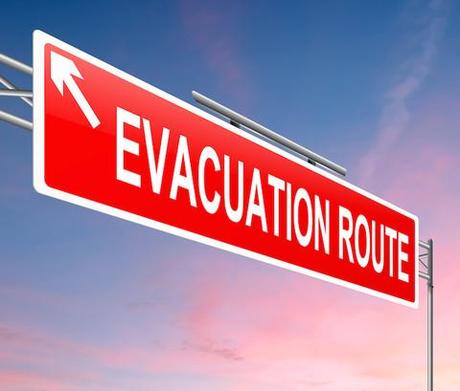
In the event of an emergency evacuation for a natural disaster like a fire, flood, or earthquake, or alternately due to a terrorist threat, it pays to have a plan of action in place so that your family can meet up and you have someplace to go until you are able to return to your home.
But this will require some forethought and planning to accomplish. Here are some tips to help you get your emergency evacuation plan in order.
-
Choose a meeting place. Your family might not be at home when an evacuation occurs. In this case, you need to have a safe place to meet - just in case phone lines are down and you have no other means of communicating with your loved ones. In fact, in the event that your original meeting place is inaccessible, it's not a bad idea to have a backup location as well.
From there, your plan should include a safe place to relocate until the threat has passed - perhaps the home of a relative or friend that can be easily reached or maybe at a second residence like a family vacation home. Getting out of town is of little use unless you have a place to go.
-
Go low tech. In the event of an evacuation, you may find yourself fighting traffic or other travelers to get to your safe haven. For this reason, you should have alternate routes at the ready. But since your devices, including your smartphone and GPS, might not work, make sure you have low-tech alternatives at the ready. This should include a battery-operated radio and current road maps marked with potential stopping points along the way.
With a little research and pre-planning, you can make your way to a safe place during an evacuation - even if you have to go out of your way to get there.
-
Plan for alternate transportation. Travel by air may be restricted, but cars, RVs, trains, and boats could all offer the alternate means of transport your family needs. The travel method you choose will depend on the travel networks and vehicles available to you, but knowing where local rental places and nearby terminals are can help you get to where you want to go in an expedient manner.
-
Packing and procedures. Being prepared for an emergency evacuation requires you to have the gas tank in at least one vehicle full and ready to go at all times. And it's not a bad idea to have extra fuel in a gas can since area gas stations will likely be parking lots. Just make sure you store it in a safe place.
You should also have bags packed for each family member in preparation for whatever weather conditions you might be facing. And essential documents and valuables should be stored in a small, portable safe. A standard disaster kit including items like food, water (or water purification tablets), medical supplies, and so on should also be easily accessible. And before you go, make sure to turn off the gas and electricity in your home (and, in the winter, the water).
-
Pay attention to early warnings. You don't want to upset your life unnecessarily, but if you wait too long to heed the warnings of an impending disaster, you could end up getting stuck in a storm or worse - in traffic. You want to get moving before weather (or other) conditions strand you, leaving you at the mercy of the situation.
But you also want to avoid the after effects. When Hurricane Katrina hit, those who remained behind were trapped in the city while some were stuck in their homes. The roads around New Orleans were badly damaged, preventing residents from leaving and aid from arriving. Many had to wait hours or even days for rescuers to reach them due to the catastrophic flooding.
Evacuation centers were established, but some were damaged, most were overcrowded, few offered sanitary conditions or adequate food and water, and these centers became scenes of desperation, danger, and violence in some cases. The city of New Orleans suffered rampant crime in the aftermath of Hurricane Katrina. This included looting, carjacking, theft, rape, and murder.
The point is that you want to get out well in advance of an impending disaster if at all possible. So if evacuations are imminent or you've already gotten an evacuation order, do not stay at home until it's too late.
If you have access to an early warning system or you've been asked by authorities to evacuate, don't hesitate to get moving. When you've planned accordingly, you'll be able to pick up and go at a moment's notice.
